Indian River County officials and at least one newly-elected Sebastian City Council member want to sit down and have a thorough discussion about the two square miles of former citrus land the city annexed in August – which the county doesn’t think is suitable for the kind of development that has been proposed.
County officials objected to the annexation before it took place and challenged the legality of the act after the prior Sebastian City Council went ahead and voted to bring into the city the tract where a massive residential and commercial development might one day take shape.
As of now, though, the two sides are blocked from talking the matter over because of pending litigation – a lawsuit brought against the city by environmentalists that has just begun snaking its way through the justice system.
Graves Brothers, a locally-based citrus grower, earlier this year asked the city to annex a 1,118-acre tract of land it owns north of 69th Street, west of 74th Avenue and east of 82nd Avenue in the county.
Despite vocal opposition from the county, environmentalists and some Sebastian residents, the city council approved the annexation on Aug. 28.
In September, the Indian River County Commission voted to initiate a conflict-resolution process that is required by the state when two jurisdictions disagree on an important matter.
“It’s important to have a conversation about a number of different issues relating to the annexation,” County Attorney Dylan Reingold said. “On several occasions, we’ve mentioned we’d like to have an honest conversation with the city about issues relating to transportation, issues relating to water and sewer facilities, issues relating to density, open space and green space.”
Sebastian City Councilwoman Pamela Rapp Parris, one of three new Sebastian City Council members sworn in Nov. 20 after three incumbents who voted for annexation were defeated, concurs with Reingold.
“I would like a meeting with the county and the city of Sebastian to come to terms with what is best for the community altogether,” Parris said.
“It’s over-densified. It wasn’t done correctly.” Parris added of the tentative plan for the annexed property. “The plan itself – if it were to go through as is – would be a disaster. It needs a lot of revisions.”
Talks were taken off the table Oct. 30, when County Judge Janet C. Croom issued an emergency injunction halting a planned conflict resolution meeting between county and city officials meant to hash out their differences over the annexed property until a lawsuit brought by the Pelican Island Audubon Society against the city is resolved.
The Audubon Society’s petition, filed in early October, alleges the city failed to follow its own code of ordinances by bypassing the Planning and Zoning Commission, provided an inaccurate map of the annexed lands in a public notice as required by state law and violated a statutory requirement that the annexation of lands be contiguous and compact. The suit also claims the city denied the public due process by restricting public comment on the matter.
Audubon and other opponents have argued the proposed development amounts to urban sprawl and would have a negative impact on area waterways and roads, increasing traffic and pollution.
Sebastian officials sought the injunction, claiming a conflict resolution meeting with the county could expose the city’s legal strategy and adversely affect it in the litigation with Audubon.
Reingold said he hopes talks will happen soon now that the Sebastian City Council has three new members. Only two members who voted in favor of the annexation remain on the council.
Parris said a majority vote of the City Council could drop the injunction, which would clear the way for talks.

